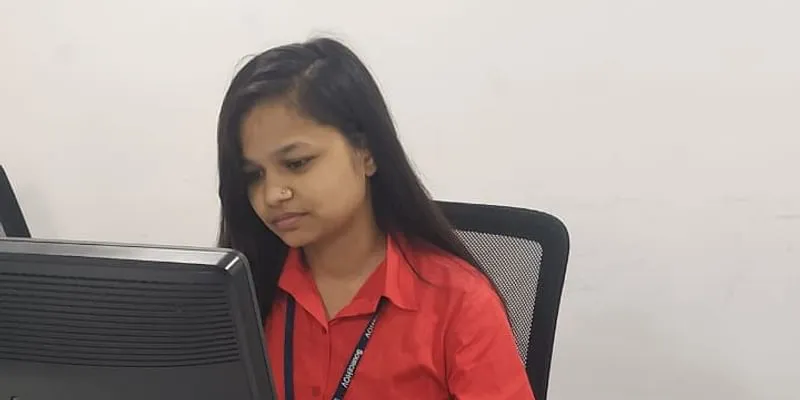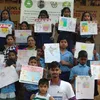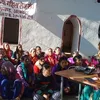How Plan India’s Saksham is skilling youth and opening up new opportunities
The Saksham programme equips youth, especially women and girls, with free market-oriented vocational skills, and job and entrepreneurial training.
Pratibha, 23, didn’t always have it easy. Living with her parents and two siblings in Meethapur, Delhi, things changed after her father met with an accident while returning from work. He severely injured one of his legs, which affected the family’s financial situation as he was the sole breadwinner. The survival of her five family members was now her responsibility.
However, Pratibha was able to find a job that paid her about Rs 17,000 every month, thanks to Plan India’s Saksham programme, which is operational in Delhi, Uttar Pradesh, Uttarakhand, Punjab, Maharashtra, and Karnataka.
Launched in 2010, Saksham focuses another kind of NEET - ‘Neither in Education, Employment or Training’ – for youth, especially girls, from urban and rural disadvantaged areas. The programme equips them with free, market-oriented vocational skills and job and entrepreneurial training.
“This not only helps them access employment and pursue entrepreneurship options, according to their aptitude and choice, but also makes them representatives of a gender-equal society and better citizens,” says Anita Kumar, Director of Programme Implementation at Plan India.
With support from corporates and Plan International offices, Plan India’s mission is to provide gainful employment to girls in the age group of 18-29 years, while also moulding today’s youth to be representatives of a gender-neutral society.
Self-sustained with Saksham
More than 21 million salaried jobs have been lost between April and August, according to a recent report by the Centre for Monitoring Indian Economy (CMIE). This has led to a need for greater attention on skill development and increase in opportunities for youth across India.
Plan India provides youth the opportunities to become economically independent by offering relevant and market-appropriate skills to get a job or be self-employed. Saksham seemed to be at the right place at the right time with its job-oriented vocational training in Delhi, Lucknow, Dehradun, Jaipur, Mumbai, and Bengaluru. The training is largely conducted in mix of English and local regional languages.

One of the training programmes at Saksham
“The training at Saksham focuses on new economy jobs and market-appropriate skills such as retail management, ITeS and BPO training, hospitality, mobile repair, general duty assistant, GST, and accounting training, etc,” Anita says.
“The trainees can pursue entry-level jobs in the aforesaid sectors, like customer care executives, general duty assistants, floor executives, delivery boys, data entry assistants, store assistants, cash, and front office management.”
Corporates who have been contacted for placements include Costa Coffee, Godrej, Burger King, Domino’s, among others.
Since its inception, Saksham’s market-linked skilling project has reached out to over 12,000 youth with over 7,000 of them being placed in respectable jobs and other livelihood activities.
The initiative is supported by various donors, including Bank of America, AXA XL, Deutsche Bank, AT&T, and Plan International Federation members.
Impact and the challenges
Pratibha’s life changed after joining Saksham and she is now working as a processer at an MNC, Excela Technology. Her father, who was earlier embarrassed at “sending his daughter out to earn”, is now proud of her and wants to give her the best education and exposure to live her dreams.
“My father and my relatives have changed their opinion regarding girls. and believe that one girl is equal to 10 sons,” Pratibha says.

Pratibha, a member of Saksham
Like Pratibha, many young girls are also dreaming of becoming salaried employees who can actively contribute to the country’s economy.
Ruksar from Jaipur hopes that the programmes reaches many more girls like her. “The visibility of Saksham should be enhanced so that more and more girls can become self-reliant and financially independent just like me,” she says.
However, things were not always smooth for Saksham.
Anita shares some of the challenges that they faced.
“Patriarchal and orthodox societies, communities, and parents still do not allow girls to move freely. This is a major impediment to ensuring participation of girls. Additionally, many urban areas are highly unsafe for girls and women, which compounds the problem,” she says.
She adds that there aren’t enough visible, successful role models. This is especially true in case of girls wherein somebody hailing from a similar disadvantaged background has become successful.
Learning under lockdown
The importance of employment and skill development has increased manifold during COVID-19. Moreover, the aforementioned statistics about jobs lost during the pandemic made it imperative to skill more youth for employability.
The pandemic didn’t stop Saksham from continuing its programmes. Classes were conducted with a mix of both, digital and physical methods, with strict adherence to prescribed pandemic-related norms.
Online training sessions are conducted via various digital platforms. One such digital platform was the SSP Education (Saraswati Swarojgar evam Prashikshan) app, launched in May 2020 by the Saksham Jaipur team. The app is available on Play Store.

Two students at Saksham
“In Jaipur, the lockdown meant the Saksham team could not connect properly with students. The team realised that students were unable to access pre-recorded videos available on courses taught under the programme,” Anita says. “The SSP Education app made it very easy.”
During the pandemic, 395 youth were trained, 169 were placed, and about 533 are still under training. In addition, Saksham also saw a placement rate of 42.7 percent across all sectors.
Apart from this, two online events were conducted by Deutsche Bank, in association with Plan India, on the themes ‘career counselling and effective communication’. These was attended by over 100 participants
The road ahead
“Plan India’s County Strategic Programme (CSP-V-2020-2025) has a strong focus on skilling and opportunities for youth employment and entrepreneurship (SOYEE). We are doing this by promoting economic rights and pro-skilling environment and a social safety net for youth, especially young women, along with bringing changes in social norms and practices and enabling adolescents and youth,” Anita says.
The organisation will also be working with secondary school children, particularly girls and young women, to make informed career choices by providing impact group access to career counselling and decent employment opportunities.
“The road ahead will focus on career counselling for youth, developing a centre of excellence, reskilling, working with schools, and focusing on COVID-19 affected communities to demonstrate models of youth employment and livelihood programmes,” Anita says.
Edited by Teja Lele








